'Blood, Sweat, and Soul': CU Denver Film & Television Turns Out Talent
One has to be really dedicated to the craft of filmmaking to manage the difficult tasks making a film requires. Tasks like raising capital for a project, mitigating all the uncontrollable variables on a set, and managing large teams of people are all part of the logistics attached to the art form. Filmmaking is not for those easily discouraged by setbacks or interruptions. Perhaps that’s why students completing their senior thesis projects in the Film & Television department at CU Denver have the look of someone who has been through a gauntlet and (just barely) emerged triumphant.
The senior thesis often takes “chunks of your soul, blood and sweat…” jokes senior Charlie Gandarias, because it represents “the highest stakes of any project,” he adds, more seriously.
The intensity and difficulty of the program, as Professor Jessica McGaugh explains, is deliberate. “Filmmaking is a challenge and one of the biggest challenges is that things often go wrong, with costuming, budgets, locations falling through, etc.” The intense curriculum acts as a litmus test for future filmmakers, McGaugh says. “Students who easily give up and see obstacles as failures don’t often succeed. While those who can be creative with alternatives and learn to roll with the punches do.”
CU Denver’s Unique Film & Television Program
The filmmaking program at CU Denver is unique in that from the very beginning, students are learning on the job—or the set, as it were. Designed as a cohort, the program allows first-year students to mingle with, learn from, and assist upperclassmen on the sets of their projects. The hands-on nature of the program is very appealing to prospective and transfer students, who are disheartened by other programs where they may not even touch a camera until much later in their schooling. As much out of necessity as anything else, the cohort nature of the program allows upperclassmen to utilize help they need in the form of crew members while the lower-level students gain valuable experience and mentorship from faculty and fellow students.
Another unique aspect of the program is the amount of high-quality gear the school has. Considering gear is often a limiting factor to independent filmmakers and other film schools, even the faculty are impressed by CAM’s inventory. There’s enough equipment to keep all the students engaged in the process of filmmaking throughout the school year, a luxury many faculty members didn’t enjoy while attending their alma maters.
When they’re not on set, students are learning via a more traditional academic approach in the classroom. Between the film-critique essays, peer reviews of fellow students’ film work, and producing their own projects, seniors in the film department have a lot to juggle. In their final semester, students must compile a film-industry-ready resume, prepare themselves for job interviews, and make as many industry connections they can.
Hollywood or Independent Film?
A key aspect of CU Denver’s Film & Television department is that it is staged to prepare students for one of three career paths: Hollywood, independent film, or graduate school.
Assistant professor Eric Jewett spent over three decades in Hollywood working as an assistant director and second unit director on both films and television series (including Star Wars, Basic Instinct, Party of Five, Weeds, and Dexter, to name a handful). Jewett is trying to create a pipeline from Denver to Los Angeles for students who wish to try their skill in the “big leagues” of Hollywood. One senior who is taking advantage of an internship is Claire Remington, who aspires to land “anything art-department-related” in a Hollywood production. After graduation, she will make her way to Los Angeles and work for one of Jewett’s contacts.
Perhaps Jewett is eager to help because of his own experience. Jewett went to Hollywood with no contacts after graduating with a film degree from Harvard. After volunteering on the sets of student films at a local film school, he made some key friends which led to a series of serendipitous opportunities. Of course, the opportunities wouldn’t have continued for him if he hadn’t been so passionate about filmmaking or useful on a set. He attributes a lot of his success in Hollywood to being a team player and someone who can work with a lot of different types of people.
Jewett’s gregarious nature shows up in class. When a student arrives on set, he greets them by name with a warm smile. Even when he is correcting technique or instructing the students, there is an obvious appreciation for their presence and the unique skillset they bring. Despite his subject matter expertise, Jewett humbly admits that the students at CU Denver are better prepared to begin working in Hollywood than he was when he first started.
Knowing the importance of putting one’s best foot forward, Jewett recently arranged for all 48 seniors to have mock interviews with industry professionals. “I got seven Hollywood professionals and two Denver professionals to spend 30 minutes with each student to practice interviewing,” he explains. Whether or not the students end up in the film industry, interviewing is a useful skill that is transferable to any career.
Jewett shares teaching responsibility for the senior thesis class with McGaugh, who is wrapping up her 14th year teaching at CU Denver. McGaugh’s professional experience, outside of teaching, has largely been in the independent film arena. While a Hollywood production employs thousands of people and has a massive budget, independent films are lean operations which require the filmmaker to play a bevy of roles. McGaugh’s most recent work includes a series called “Womanhood” which explores the oftentimes embarrassing and difficult moments women face in an unassuming and sometimes comical way. In true independent film style, McGaugh created, produced, directed, and edited the series, while fellow CU Denver faculty member Roma Sur lent her talent for screenwriting to the project. Independent filmmakers don’t have the luxury of relying on the distribution channels that studios in Hollywood have, so they are also responsible for marketing their work and seeking places for it to screen.
Independent and non-fiction film dominate the industry in Colorado and several faculty members at CU Denver have experience in this genre. Some work on their own independent projects while also contributing content that is shown on Rocky Mountain PBS, or used by companies in Colorado’s aerospace industry, to name just a couple examples. Students who wish to pursue careers in non-fiction filmmaking are often keen to stay in the state after graduating due to the many career opportunities it has to offer.
Big Enough, But Not Too Big
It's not only the skills the students pick up during their time at CU Denver that will propel their career, but also the friendships they make. Thanks in large part to the cohort style of the program, students make friends that they keep for decades after graduating. McGaugh says the size of the program is ideal for this dynamic. “It’s big enough to make a lot of friends but small enough that everyone knows one another,” she explains. Given the networking-driven nature of the film industry, having friends also working in film can be a real boon to one’s career.
The “just right” size of the department also means that faculty members can be more invested in the students’ projects. It’s not uncommon, for instance, for a student project to shoot scenes at 2 o’clock in the morning in exchange for empty spaces and/or cheaper set costs. Professors show up, just as eager to get the right shots and see a project through to completion as the students are. McGaugh explains that a faculty member has to love the energy, process, and collegiality of filmmaking in order to show up on a set at 2 am. Plus, it helps that the students who call CU Denver home are “genuinely fun to be around…If they were all jerks, there’s no way we’d be able to handle it,” she says with a grin.
The program has gone through many revisions throughout the years McGaugh has been on the faculty. She started when the department was actually film and theater, and was a part of the push to move away from theater and toward television. Last year the school launched an Industry Pathways course, which teaches students business skills like writing and managing invoices and working with insurers—all things that independent filmmakers, especially, need to know how to do. The school’s Non-Fiction Writing class teaches the dynamics of writing for grants and marketing, which is very useful in an industry where most workers are essentially freelancers.
Cinefest Gives Students a Chance to Show Off Their Work
Because of the intensity the school year brings, students and faculty alike look forward to Cinefest, an annual event where graduating seniors screen the projects they’ve been working on for the past year and which represent a culmination of the skills they’ve learned over their years at CU Denver. Cinefest is the creation of associate professor and award-winning documentary-maker Hans Rosenwinkel.
Graduating senior Peyton Haggerty attended Cinefest her first year at CU Denver and was inspired by what she saw. “It was so cool to see what the older students made,” she says. This year, Haggerty wrote the script for “Venus Inn”. Haggerty’s classmate, Becka Jimenez, was the producer for the film project and says Cinefest motivated her to make a good film. “I know at the end of the year it will be shown to friends, family, and other CU Denver students,” she explains. Not only will senior films be shown at Cinefest and potentially win awards selected by the faculty, they also make an important addition to students’ resumes (or reels, as they are known).
At the end of four years, the students are overjoyed as they walk down a (literal) red carpet into the King Center on the Auraria Campus to show their friends, families, and peers what they’ve put so much of their heart and soul into. Sometimes it’s hard to discern who is prouder, though—the students or the faculty.
“I think we’re turning out talented filmmakers and I’m excited to be doing that,” concludes Jewett.
More information about this year's Cinefest can be found here.
Written by Megan Briggs-Pintel, CAM Communications
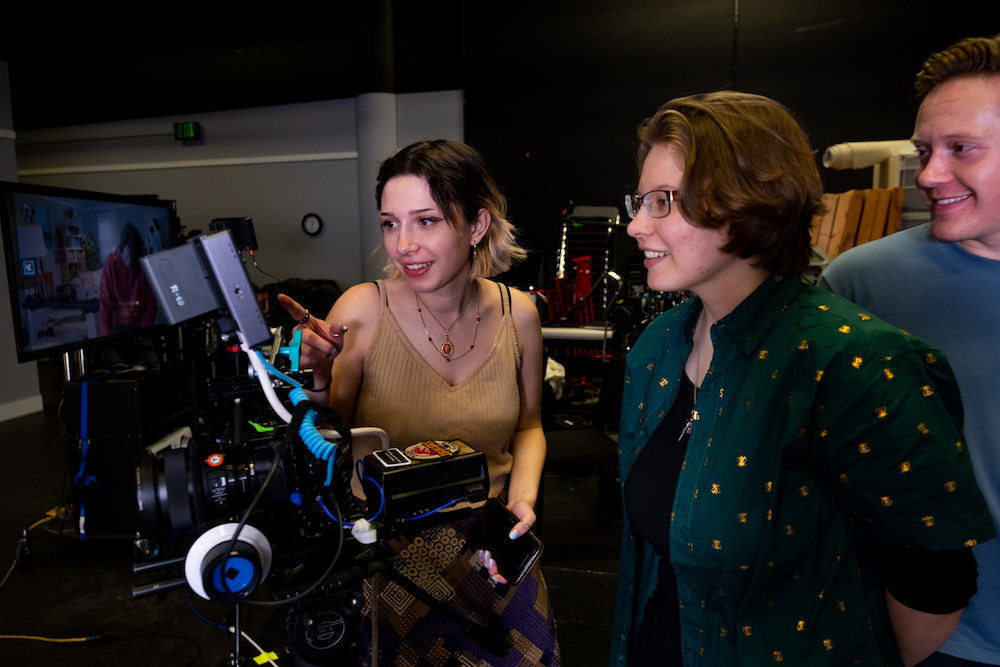

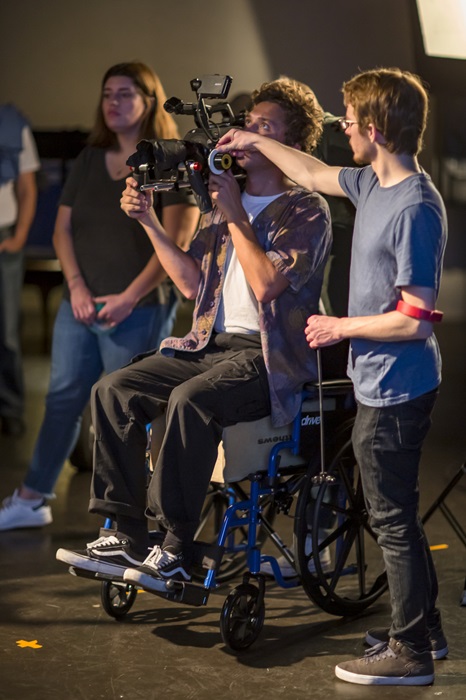
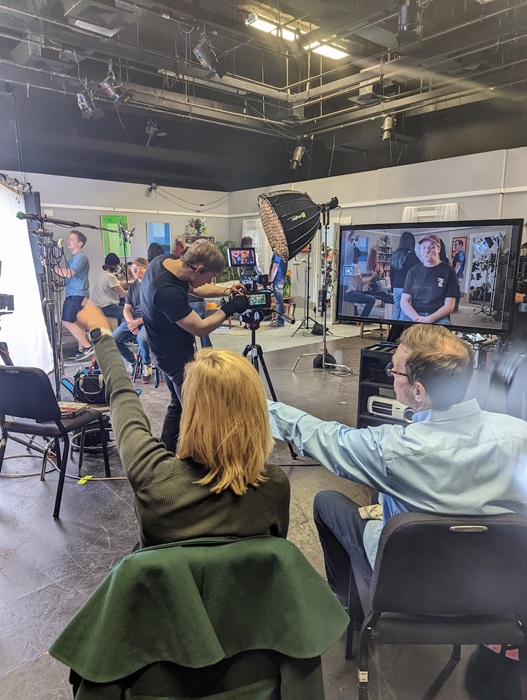
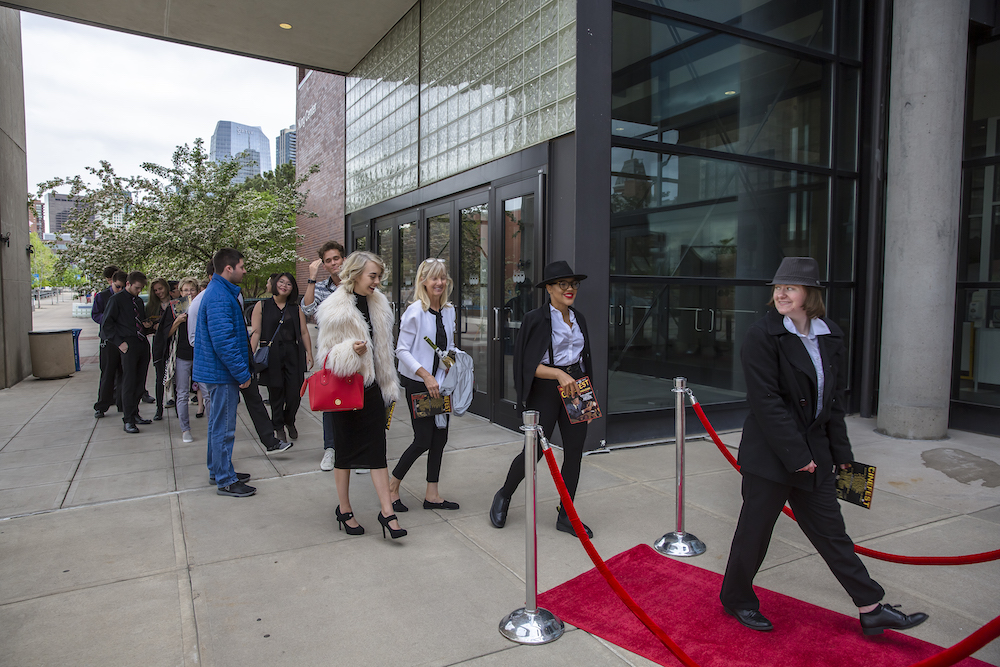
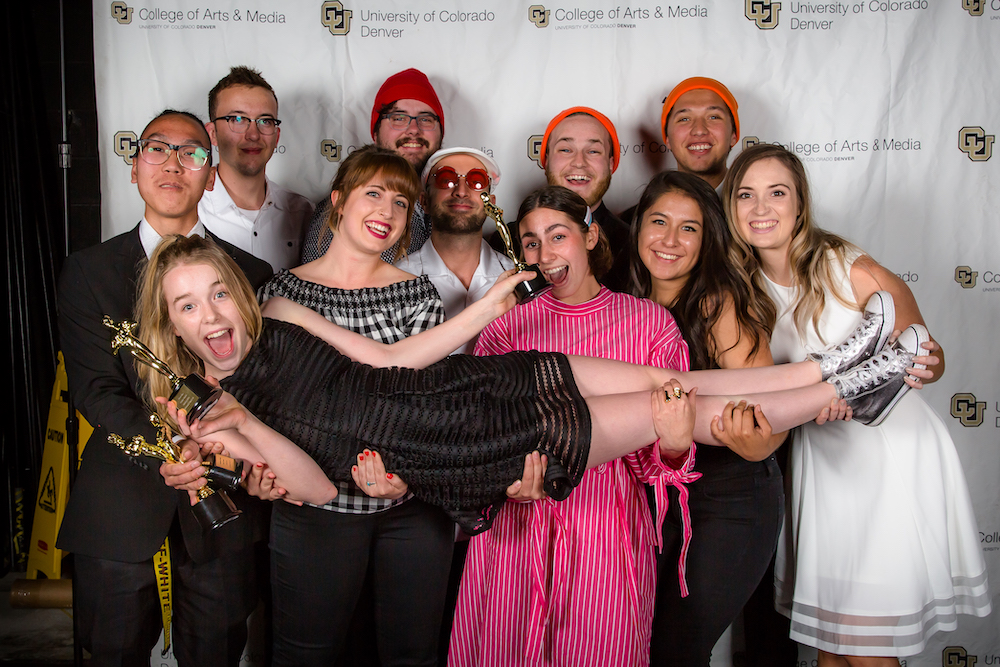
(1/12)
(2/12)
(3/12)
(4/12)
(5/12)
(6/12)
(7/12)
(8/12)
(9/12)
(10/12)
(11/12)
(12/12)